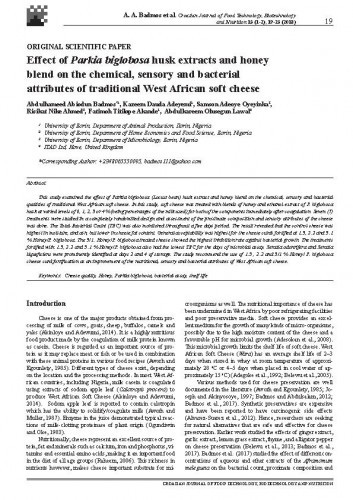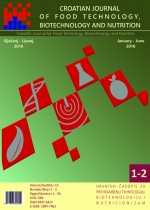This study examined the effect of Parkia biglobosa (Locust bean) husk extract and honey blend on the chemical, sensory and bacterial qualities of traditional West African soft cheese. In this study, soft cheese was treated with blends of honey and ethanol extract of P. biglobosa husk at varied levels of 0, 1, 2, 3 or 4% (being percentages of the milk used) for both of the components immediately after coagulation. Seven (7) treatments were studied in a completely randomized design and assessment of the proximate composition and sensory attributes of the cheese was done. The Total Bacterial Count (TBC) was also monitored throughout a five days period. The result revealed that the control cheese was highest in moisture, and ash, but lower in cheese fat content. General acceptability was highest for the cheese curds fortified at 1:3, 2:2 and 3:1 % Honey/P. biglobosa. The 3/1: Honey/P. biglobosa treated cheese showed the highest inhibition rate against bacterial growth. The treatments fortified with 1:3, 2:2 and 3:1 % Honey/P. biglobosa also had the lowest TBC for the days of microbial assay. Seratia odonrifera and Seratia liqueficiens were prominently identified at days 2 and 4 of storage. The study recommend the use of 1:3 , 2:2 and 3/1 % Honey/ P. biglobosa cheese curd fortification as an improvement of the nutritional, sensory and bacterial attributes of West African soft cheese.
Sažetak
Dio od

 Hrvatski časopis za prehrambenu tehnologiju, biotehnologiju i nutricionizam : Croatian journal of food technology, biotechnology and nutrition : znanstveno- stručni časopis za prehrambenu tehnologiju, biotehnologiju i nutricionizam : 13,1-2(2018) / glavni urednik, editor-in-chief Jadranka Frece.
Hrvatski časopis za prehrambenu tehnologiju, biotehnologiju i nutricionizam : Croatian journal of food technology, biotechnology and nutrition : znanstveno- stručni časopis za prehrambenu tehnologiju, biotehnologiju i nutricionizam : 13,1-2(2018) / glavni urednik, editor-in-chief Jadranka Frece.